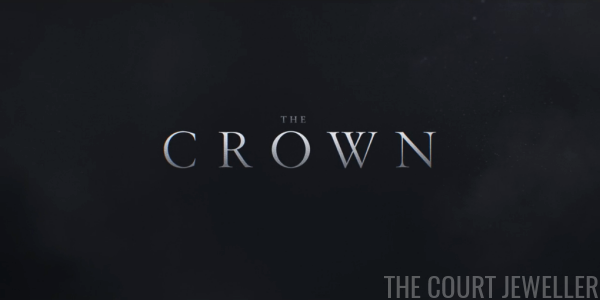
Our recap of the jewels of episode five of Netflix’s The Crown is coming at you a day early, thanks to tomorrow’s holiday here in America. I don’t think you’ll mind having it a bit early, though, because it’s a sparkling one. Last episode was all about how fog obscures; this time, “Smoke and Mirrors” focuses on the way that monarchy conjures up magic.
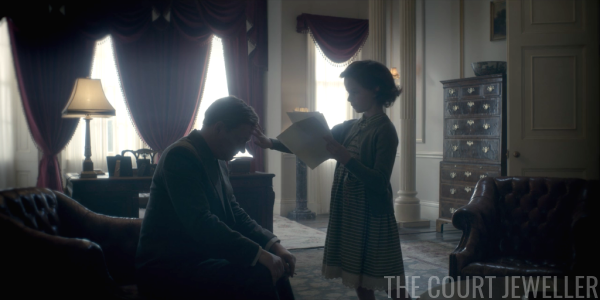
We begin in May 1937. Wee Princess Elizabeth is helping her father, King George VI, rehearse his coronation. They’re working on one of the most important parts of the service: the moment when the Archbishop of Canterbury anoints the monarch with holy oil. (Remember that the last episode included a conversation between Elizabeth and Queen Mary about the monarch’s connection to God.)
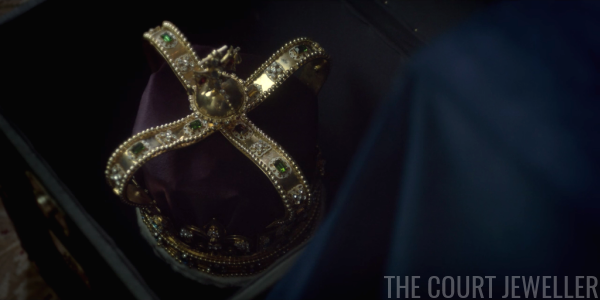
The rehearsal is interrupted, because the crown jeweller has brought over the crowns for Bertie to try on. First, we see the production’s replica of St. Edward’s Crown, which is the crown that the monarch wears only once: when he or she is crowned during the coronation. (This was an old tradition revived by George V in 1911, and George VI and Elizabeth II followed his example.)
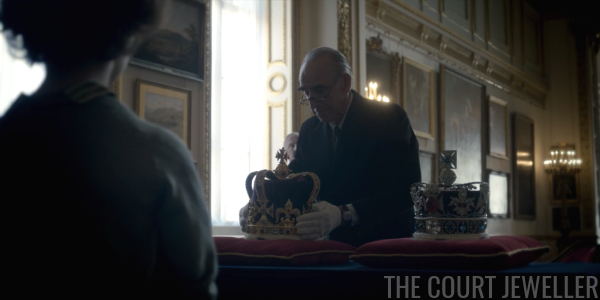
The real St. Edward’s Crown was made in 1661 after the restoration of the monarchy, and it was patterned on the original crown, which was melted down after the execution of Charles I. The other crown is the Imperial State Crown, which had just been remounted specifically for King George VI by Garrard before the 1937 coronation. The monarch wears the Imperial State Crown during part of the coronation; it’s also the crown worn during the state opening of parliament.
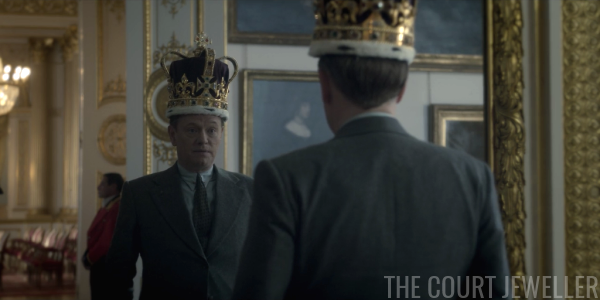
Bertie tries on St. Edward’s Crown and regards himself in the mirror. This is the first of four monarch/mirror scenes in the episode. Bertie doesn’t like what he sees, noting that he wishes he’d never had to look at himself wearing the crown. He also remarks on the crown’s weight, both physical and symbolic.
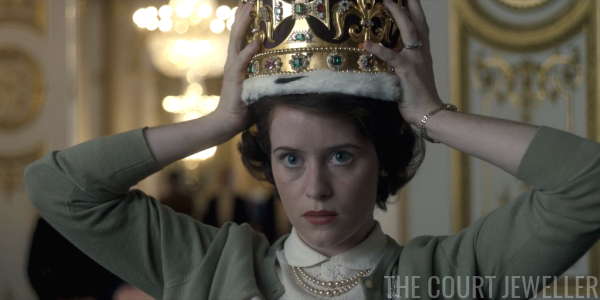
We flash forward to March 1953, when Queen Elizabeth II is trying on St. Edward’s Crown ahead of her own coronation. I think that the replicas of the two crowns in this production are … fine. It’s really, really hard to make the settings of a replica crown look real. They all look plasticky.
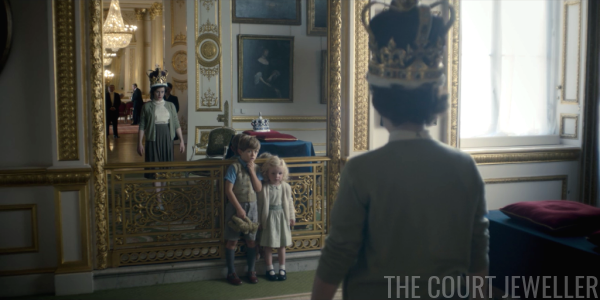
Like her father, she looks very seriously at herself in the mirror. (She also has another mirror in this scene: her son, Charles, who will likely one day wear this crown himself.) Elizabeth asks the crown jeweller (the same one who delivered the crowns to her father) if she can borrow the crowns to practice. He’s a little flabbergasted that she feels she has to ask — they sort of belong to her, after all.
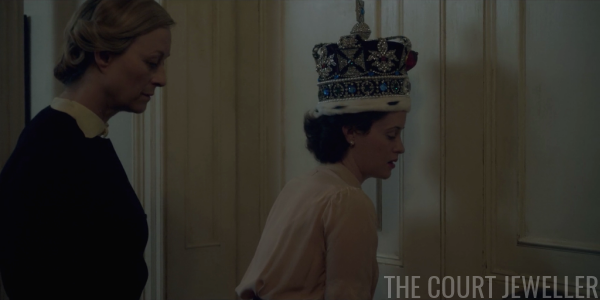
Next, Elizabeth decides to pop on the Imperial State Crown and go surprise Philip. But he’s not around — he’s out taking another flying lesson.
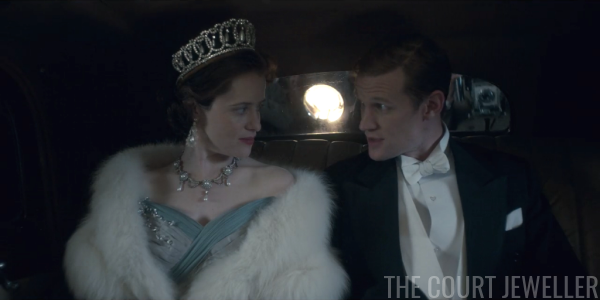
That night, Elizabeth puts on another set of royal jewels for a trip to the Royal Haymarket to see a play. We saw this scene in the trailer, so we’ve already dissected the big problem with it: Elizabeth had none of these jewels in her possession in March 1953. Queen Mary is still alive at this point in the episode, so the Vladimir Tiara (which seems too big?) and the Gloucester Pendant Earrings still belonged to her. And Queen Alexandra’s Wedding Necklace (which is too small) belonged to the Queen Mother — we saw it on her in episode one. Elizabeth didn’t inherit this until 2002, and she’s actually never worn it in public.
During this royal theater date, Elizabeth asks Philip for a favor: she wants him to be on her coronation committee. He says he will, but only if he can be in charge. (He really was chair of the commission, but that appointment happened a year earlier, in April 1952.)
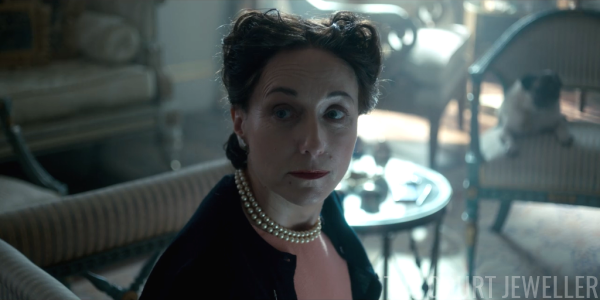
While coronation preparations are in full swing in Britain, the Duke and Duchess of Windsor are settling down in their new villa in Paris.
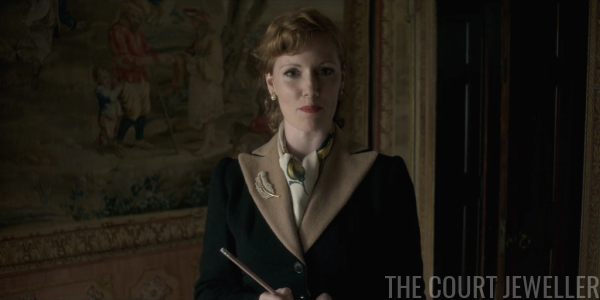
Because the royals have cut them off, they need a new source of income. In this scene, they’re cashing in on their fame with an interview and photo shoot for a publication. The interviewer is in her professional pearls, including a leaf-shaped brooch.
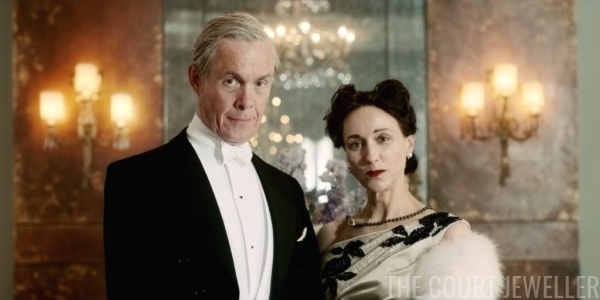
David and Wallis obediently play dress-up for the photographers. Here, Wallis wears dresses up in formal jewels…
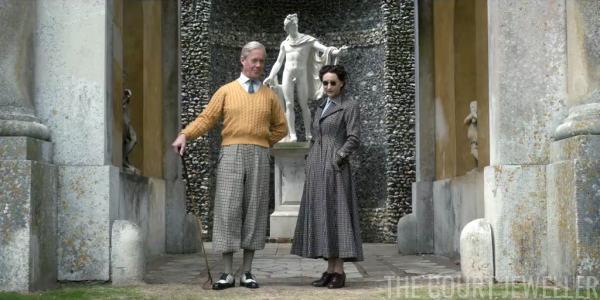
…and in sportswear.
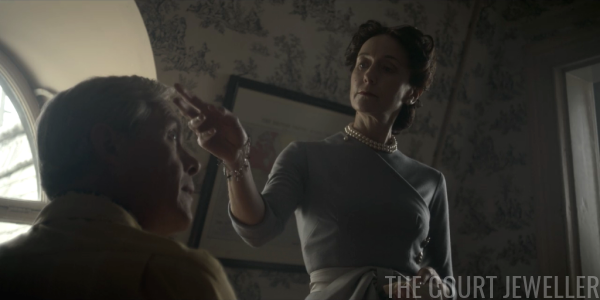
David even lets the interviewer in to his little shrine to his ten-month reign. She asks why there are no photos of him wearing the crown, and he replies that he didn’t make it that far — that he didn’t have a coronation. As he says this, Wallis reaches out and fixes his hair. The scene is shot from below, so she looms large, as the powerful reason that David didn’t reach the pinnacle of power.
And the jewelry she’s wearing here are replicas of real pieces from her collection: two pearl necklaces, the longer of which with its pearl pendant, worn off-center. The shorter of the two necklaces, in real life, was the only piece of jewelry that Queen Mary gave to David; it may be the pearl necklace bought by George V from the estate of Marie Feodorovna of Russia. The bracelet worn on her right wrist is the production’s version of Wallis’s gem-set cross charm bracelet, which was made by Cartier.
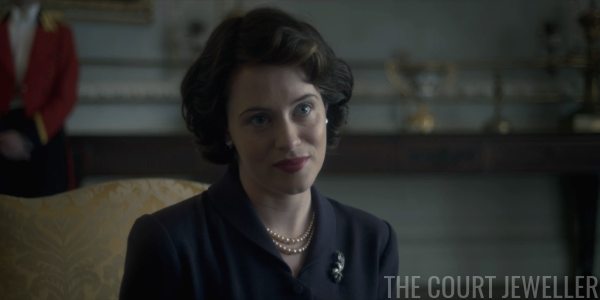
As the Windsors play for the cameras, Queen Elizabeth II is presenting her plans to have Philip lead her coronation commission. She’s wearing one of the “inspired by” brooches here.
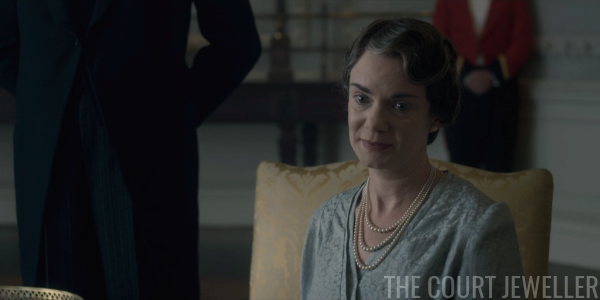
Nobody but Elizabeth and Philip are excited about his proposed role in the coronation planning. Here’s the Queen Mum’s reaction. (I’m disappointed at how small her role has been in this production so far. I’m also disappointed that we’ve had so few decent close-ups of her jewels. These things go hand in hand.)
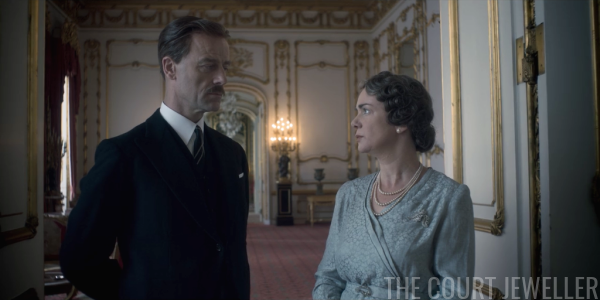
As Tommy Lascelles and the Queen Mum decide how to keep the Duke of Windsor away from the coronation, we get a Brooch Continuity flub: the QM wasn’t wearing a brooch during the meeting, but immediately afterward, she has a diamond feather brooch pinned to her dress.
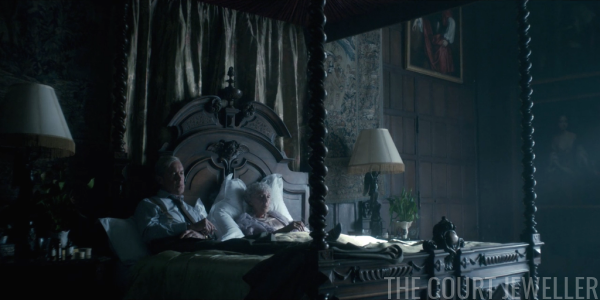
The Duke of Windsor is a pressing issue, because he’s in town to visit Queen Mary. She’s dying. The two of them bond as much as they can, the best way they know how: silently smoking next to each other in her sickbed.
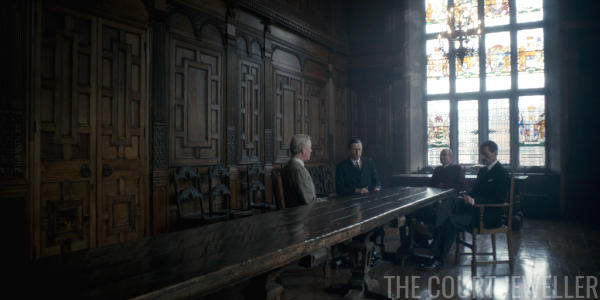
Lascelles and the Archbishop of Canterbury (played by Ronald Pickup) break the news to David that Wallis isn’t going to be invited to the coronation. Predictably, he refuses to attend himself, on the grounds that Wallis should be included — which is exactly what they want him to do.
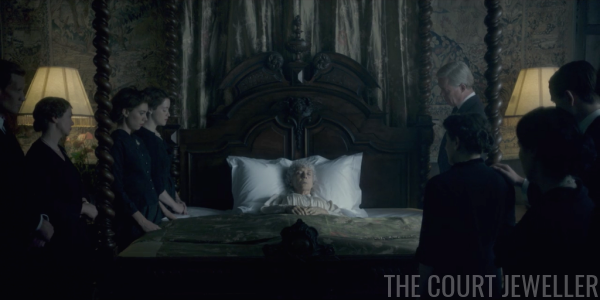
The meeting is interrupted by a call from Marlborough House. Queen Mary has died. The family gathers at her bedside. We recognize the four figures on the left as Queen Elizabeth II and her family. David stands on the right. We’re not introduced to the others in the frame, but there are several other people who would have been present, including the Princess Royal, the Duchess of Kent, and the Duke and Duchess of Gloucester.
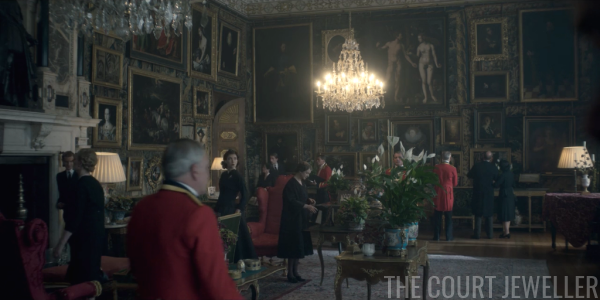
Immediately after her death, the family is milling about, picking out things they’d like to have. (I find this a little strange, because I’m pretty certain she left virtually everything she owned to Queen Elizabeth II.) David narrates all of this in a letter to Wallis. He hates everyone and everything. (I think that David’s perspective is particularly useful in the later scenes of this episode, but I’m disappointed that we viewed Mary’s death through him. I wanted to see more of the Queen’s perspective, given the close connection that the series has developed between the two. I also wish there had been an acknowledgment that Mary didn’t want her death to delay Elizabeth’s coronation.)
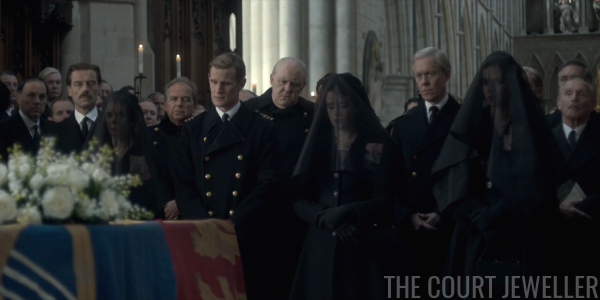
The family gathers for Mary’s funeral; the production appears to have combined her state funeral in London and her burial service at Windsor for this scene.
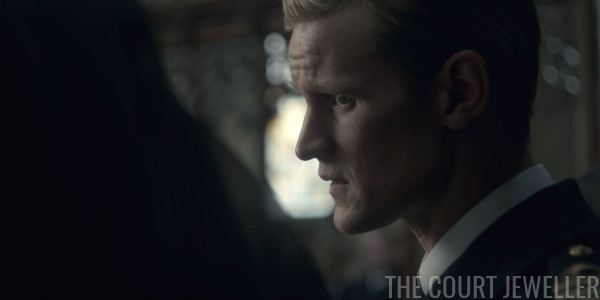
Philip whispers to Elizabeth about the funeral’s repetitiveness — it’s just the same as George VI’s funeral. Who needs all this tradition, he whispers, when you can have modernity? They’re standing in the front row, and I can’t believe Elizabeth lets him talk as long as she does before shushing him. Have some respect, Phil.
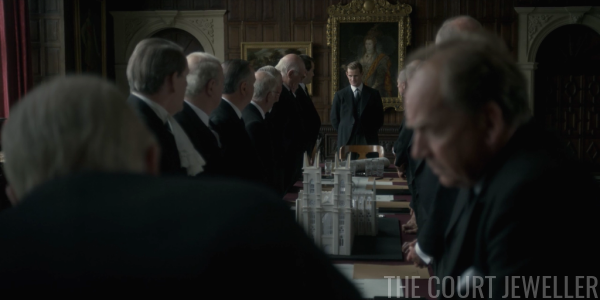
Philip takes his feelings about change with him to the first meeting of the coronation commission, where he’s seated across from that old symbol of tradition himself, Churchill. Philip also literally has royal tradition looming over his shoulder. Behind him, that’s the Rainbow Portrait of Queen Elizabeth I.
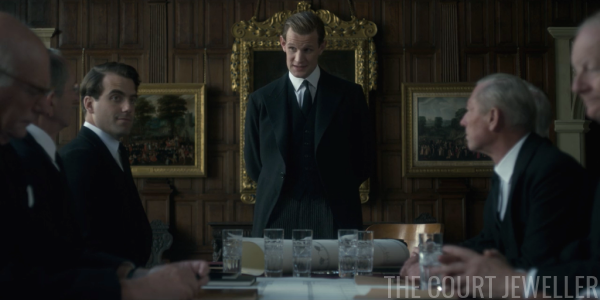
As Philip begans to outline the changes he wants to make to the traditional coronation service, however, the portrait is obscured behind him, as if he’s blotting out history itself.
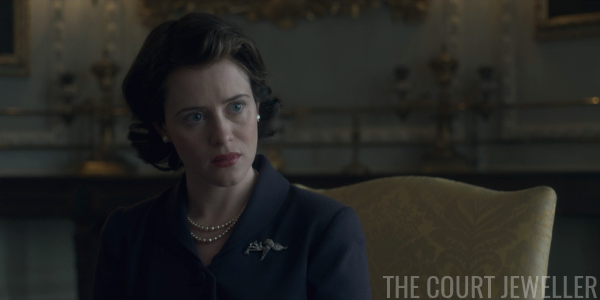
Members of the committee are alarmed enough by Philip’s plans to ransack tradition that they send Churchill in to talk to the Queen about her meddling husband. She wears the other “inspired by” brooch to hear his concerns. One of the things they’re most upset about is…
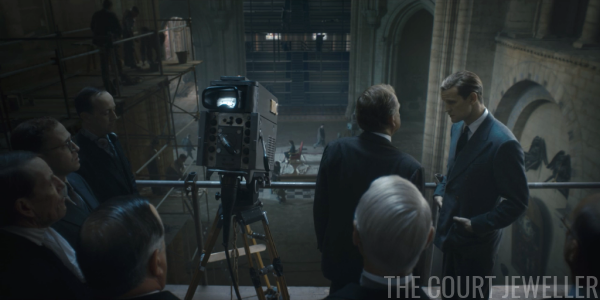
…Philip’s plan to have the coronation televised. People watching the service at home wouldn’t observe the proper respect for the ceremony, they worried. They could eat while watching!
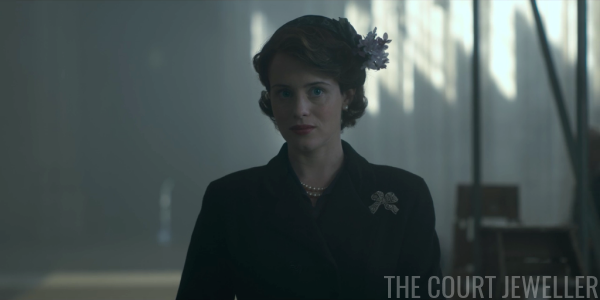
Elizabeth heads to the Abbey, wearing the “inspired by” bow brooch, to try to diffuse the situation.
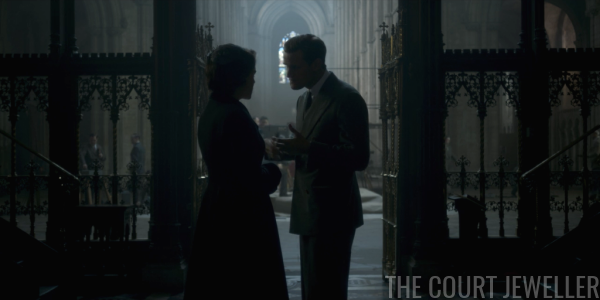
She and Philip end up rowing in the quire. She finally agrees to have the coronation televised — but only if Philip will kneel and pay homage to her, just as the other peers will. He is extremely unhappy about this prospect, and they have an even bigger fight about husbands and wives and masculinity. Seems like Queen Mary should maybe have addressed that letter about Elizabeth Mountbatten vs. the Queen to Philip instead.
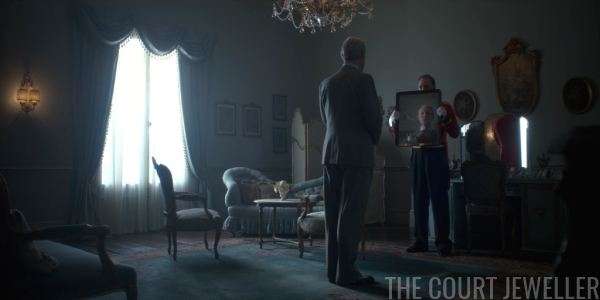
Coronation day dawns, and we’re in Paris with the Duke of Windsor. In our third mirror scene of the episode, David adjusts his outfit in a mirror. He’s the only monarch in the episode who doesn’t wear the St. Edward’s Crown when he looks in the mirror (again, because he wasn’t crowned, so he never wore it).
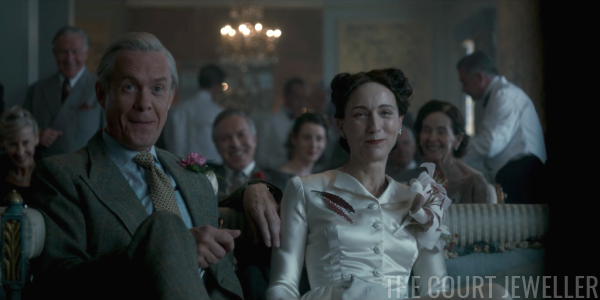
David and Wallis aren’t going to the coronation, but thanks to Philip and the magic of television, they can host a watch party in their villa for lots of their friends. They get very fancy for the occasion; check out that giant feather brooch on Wallis’s dress.
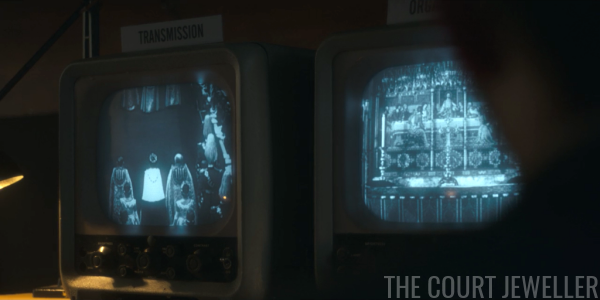
I like the way that The Crown approached the coronation ceremony. Because it really was televised, we’re pretty familiar with the images of most parts of the service. In this episode, that’s how we see most of the coronation: through cameras and lenses and filters and television screens.
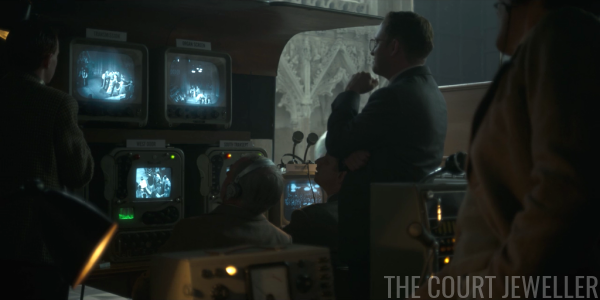
But as the service progresses to the anointing — the part that little Elizabeth and her father were rehearsing at the beginning of the episode — the television cameras cut away. This also happened in the real-life broadcast. The anointing was too sacred, it was thought, for television cameras to film it. Only two coronations — 1937 and 1953 — have been documented by either photographic or television cameras, and the anointing was not captured in either case. Only the people who were actually present could see it, and even then, the monarch is covered by a canopy, further shielding the moment from view.
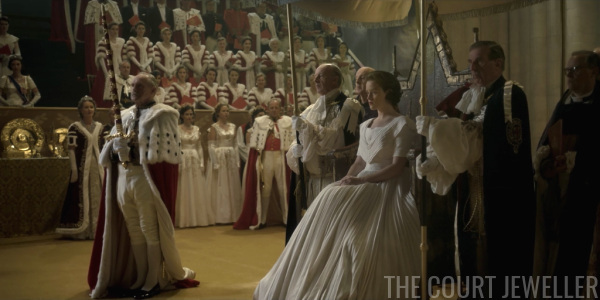
I think it was rather brilliant, then, for the series to bring us inside the coronation at precisely this moment. It gives us a view we’ve never seen before; it also resonates with the Queen’s conversations with her late father and late grandmother about the relationship between the monarch and the divine.
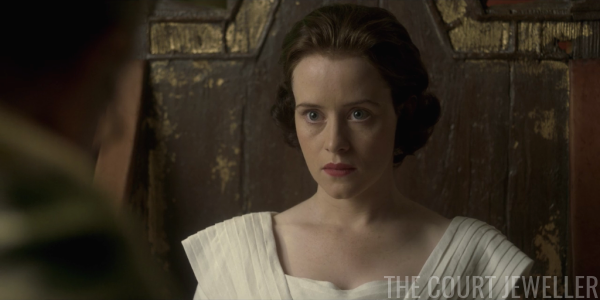
For this sacred encounter, all of the bejeweled splendor of monarchy is removed. It’s just the Queen, the Archbishop of Canterbury, and the holy oil.
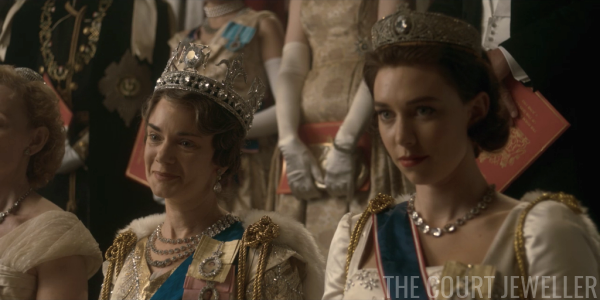
The series lets us watch some of the other major players watching the sacred anointing. Here’s our first look at the replicas of the Queen Mother’s and Princess Margaret’s coronation jewels. (See this photo from the coronation for comparison purposes.) The Queen Mother wore the circlet from her crown, which includes the Koh-i-Noor diamond. (The replica here is too tall and too closely-gathered.)
In real life, Princess Margaret wore the Cartier Halo Tiara at the coronation, but the series has substituted a completely different tiara here. I’ve read that there were copyright issues with reproductions of the Halo tiara. It’s understandable, then, that a substitution had to be made, but the difference is really jarring, especially when placed beside the more carefully replicated jewels worn by the Queen Mum.
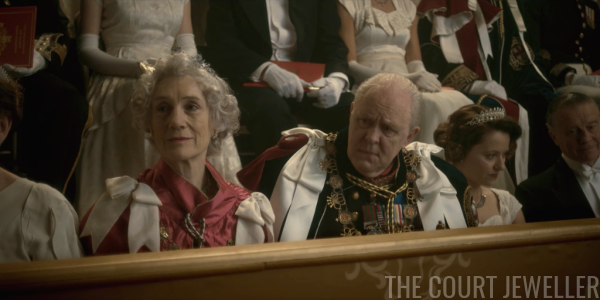
Clementine Churchill is wearing a sort of diamond floral tiara here; in real life, she wore the Essex Tiara, which was also made by Cartier. Perhaps all Cartier jewel replicas were nixed? Is that why we’ve not seen the Nizam tiara or necklace?
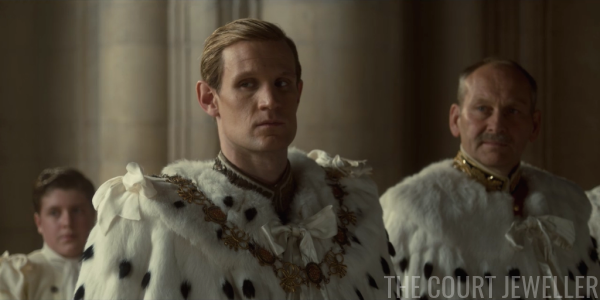
Philip, wearing the collar of the Order of the Garter over his robes, looks a little ill.
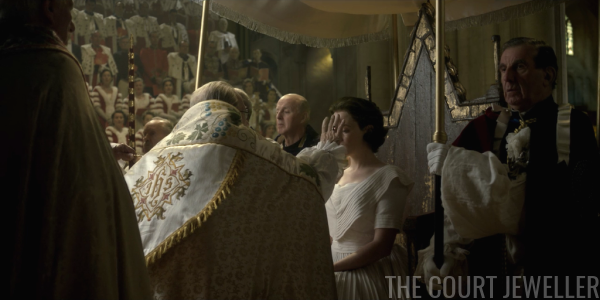
For his houseguests, the Duke of Windsor offers various reasons that the anointing is not being shown on television. In the end, it all boils down to perception: an ordinary woman becomes extraordinary when wrapped up in the trappings of monarchy. She becomes more than a human; she becomes a goddess.
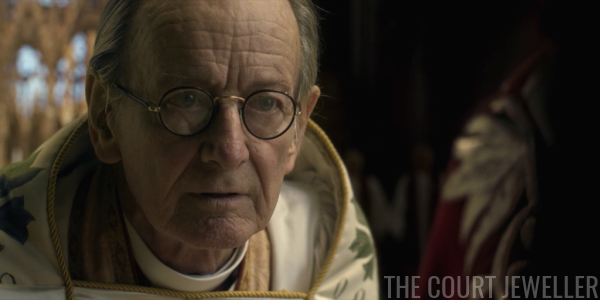
As the Archbishop finishes the anointing, he looks at the Queen as if she is exactly that: something new, something changed, something almost divine.
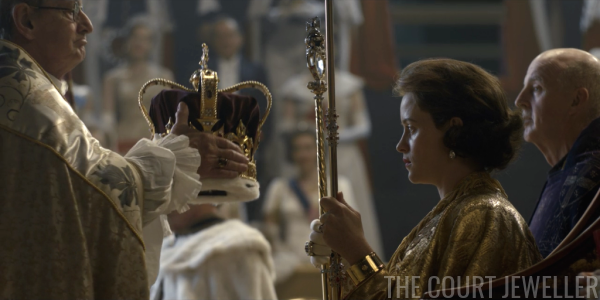
We get to see two more parts of the coronation “in person.” First: the coronation itself. Here, you can see the replica versions of the sceptres and the gold armills.
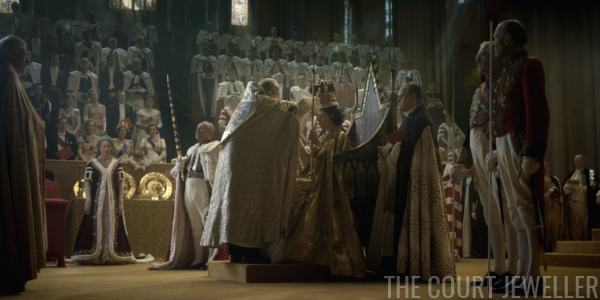
We’ve seen several different kinds of crowns in the series so far, and we’ve seen two monarchs place the crown on their own heads, but this is the moment when we actually see the crown used to create a monarch.
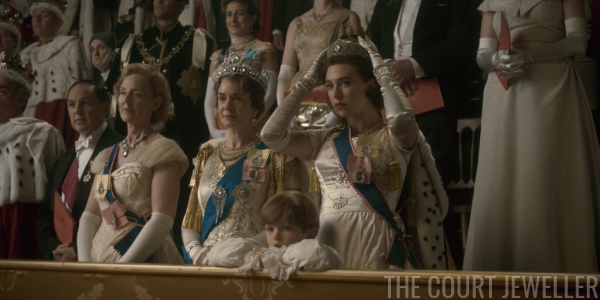
The peers in attendance replace their coronets, and so does Princess Margaret (with her distracting tiara). A couple of other things here: the production’s version of Queen Victoria’s waterfall brooch, pinned to the Queen Mum’s Garter sash; bored Prince Charles; and the woman standing next to the Queen Mother. She should be the Princess Royal (George VI’s sister), but the tiara isn’t right, and she’s not wearing robes.
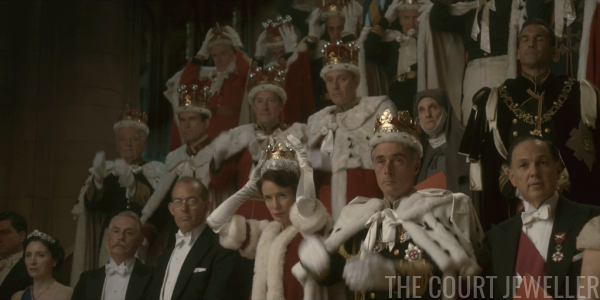
The camera slides to the other side of the royal box, where the Mountbattens sit. (For some reason, the production has put Edwina Mountbatten in the Spencer Honeysuckle Tiara?!? Some have suggested that the real tiara she wore at the coronation, the Mountbatten Tiara, might have been made by Cartier. Maybe this substitution is proof of that?) Also: there’s Princess Andrew (Philip’s mother) in her habit, sitting behind her brother. And I think the woman at the far left of the image is wearing a replica of Queen Mary’s Honeysuckle Tiara, so perhaps she’s meant to be the Duchess of Gloucester?
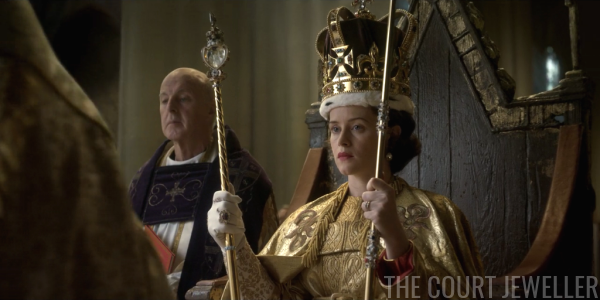
Here’s another view of the production’s replicas of the crown jewels. We get a good look here at the coronation ring, worn on the right hand.
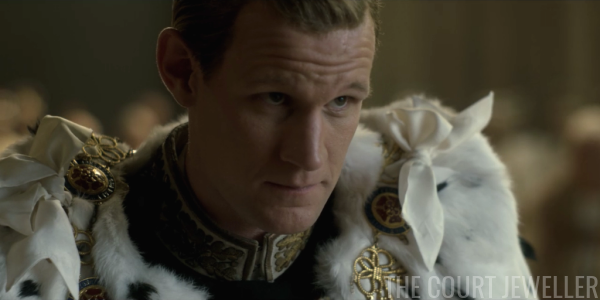
After the Queen is crowned, Philip approaches the dais and kneels before his wife, paying homage to her as his monarch.
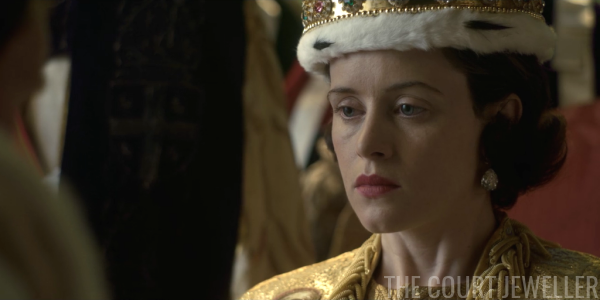
Elizabeth is stoic. (I also appreciate that they let her look a little tired in the coronation close-ups.) Note the coronation earrings here.
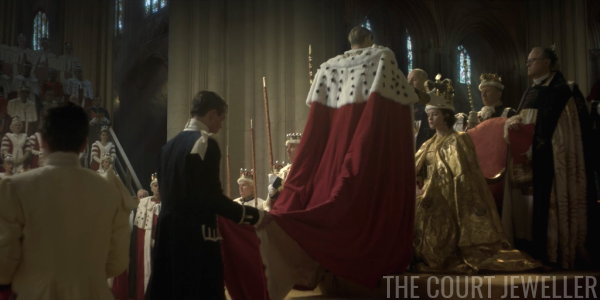
After Philip rises, he taps the crown, which is part of the homage. (Here’s your friendly reminder that, in real life, at the end of the coronation, Philip went up to Elizabeth, looked at the Imperial State Crown on her head, and coolly asked, “Where did you get that hat?”)
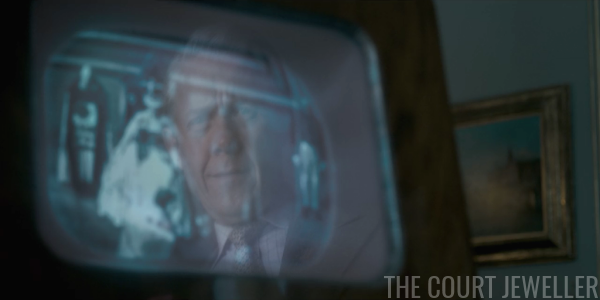
And then we pull back out of the Abbey, viewing the rest of the coronation on television screens. Back in Paris, we get our last “mirror” scene of the episode. The Duke of Windsor is reflected in the glass of the television screen, but he’s also seeing the monarch — someone he used to be and isn’t anymore. Even the grand tale of abdicating for love seems to stick in his craw at this moment.
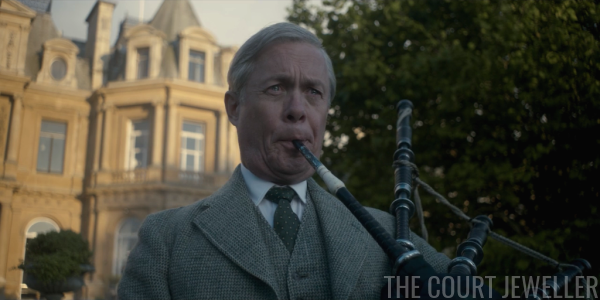
What’s a former king to do? Play bagpipes and cry. As one does.
Leave a Reply